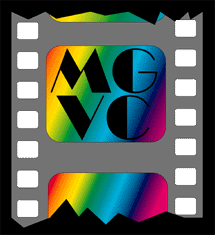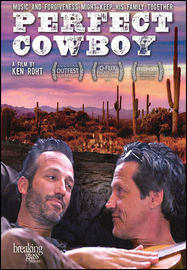(2015, 111 min)
Country: U.S.
Director: Ken Roht
Studio: Breaking Glass Pictures
Language: English
SYNOPSIS: When hard-drinking singer/songwriter Jimmy Poole returns after a stint in prison, he finds that things have changed back home. His longtime partner Ty seems to be doing just fine without him, and the son they raised together has taken over his place as the lead singer in his country-western band. As Perfect Cowboy Jimmy struggles to retake center stage in his own life, he ends up alienating those he loves the most. And when he reveals what happened to him in prison, it threatens to break up his relationship with Ty for good. Will their family's collective love for making music be enough to keep them together?
REVIEW:
Ken Roht directed, wrote and stars in the story of a middle-aged gay country singer, his guitar-playing life partner and their musician son. The horse ranches and honky-tonks of California’s Central Valley might seem an unlikely setting for a movie about a long-term gay relationship, but that’s one of the key points of Perfect Cowboy, which locates uncharted territory in familiar terrain.
For his first feature as a writer-director, actor Ken Roht set out to make an “alternative family film,” hoping to reach LGBT teens despairing in closed-minded quarters of the American heartland. The result is an uneven, at times ungainly movie, but one whose soulful messiness mirrors the lives of its stereotype-defying characters. The down-home sense of place and, especially, the complicated protagonist, played by the director, are the key strengths of the overlong drama, which screened as a world premiere selection of Outfest in Los Angeles.
Like almost all the characters in the film, the hard-drinking country-rock singer Jimmy Poole is idiosyncratic, not emblematic, and Roht, an actor with extensive theater experience, brings a compelling mix of charisma and bad-boy rebelliousness to the role. After three years in Folsom State Prison for one of his drunken escapades, Jimmy has to navigate a reunion with his life partner, the gentle and even-tempered Ty (Jeffrey Watkins). Upon Jimmy’s return to their modest house in horse country, the middle-aged men are awkward, tender and shy with each other, and, in Jimmy’s case, evasive: He’s concealing information that he fears will destroy the relationship. For his part, Ty finds himself caught between his partner and his son, Mark (William Nicol), who stepped in as frontman of their band while Jimmy was in stir.
The resentment and rivalry between the up-and-coming musician and the seasoned old-timer is aggravated by the history that sets them apart in their rural community. Jimmy is, essentially, Mark’s second parent. Over their 20 years together, the two men raised Mark while his mother, Lacy (Charla Cochran), overcome with shame and anger about her failed marriage and her own struggles, was out of the picture. Lacy leads an almost monastic life in a one-room house on a ranch run by Ty’s sister (Sharon Bollum, conveying understated compassion), and is slowly being drawn back into the family. Lacy's story is one of the movie’s most fascinating threads, but it gets muddled by the surfeit of action and asides that have far less emotional weight.
One such aside arrives with a jolting late-in-the-proceedings shift to Branson, Missouri, where Mark, after leaving an unhappy marriage, is performing in just the kind of cheesy stage show that he swore he’d never do. Roht embraces many aspects of country tradition — the church-service bell choir he includes is a highlight — but the Branson sequences, in all their onstage and offstage corniness, feel tacked-on, the dramatic point of view unclear other than to show that the stars-and-stripes revue includes gay performers.
It’s not the only section where the dramatic expanse becomes unwieldy. The film’s pacing and sense of proportion are often off, and a number of individual scenes aren’t sharp enough, even when they contain exceptionally well-played interactions. The dialogue sometimes belabors obvious points, which is especially unnecessary given the musical aspect of the film, with much of what Jimmy and Ty have to say to each other expressed, quite well, in song.
Roht has a fine voice, and he captures Jimmy’s stage swagger perfectly. This is a man who’s more comfortable in front of a crowd of strangers than in an intimate one-on-one, particularly when he’s keeping a dark secret from Ty. The actors turn the two men’s give-and-take, whether they’re arguing, flirting or working out a number in the kitchen, into the film's heart and soul.
At its best, Perfect Cowboy depicts untidy emotions and flawed characters as a domestic relationship hits rough waters. In the down-to-earth cowboy setting, it’s a relationship that has no name or social cause attached to it but simply is, and neither partner occupies a role-model pedestal. Roht mostly avoids preachiness in his emphasis on family values that are genuine rather than politically defined, although the religion-based judgments of Mark’s small-minded wife (Sienna Beckman) set up a very obvious polarity. Her hissable pronouncements prove distractingly on-the-nose.
Similarly overdone are a couple of moments when cinematographer Jeremy Glaholt uses stylized effects to convey intense or disorienting experiences. Mostly, though, his camerawork is suitably unfussy and in sync with Roht’s sure grasp of the milieu, with its barrooms and barn dances where Jimmy and Ty shine.
-- Reviewed by Shen Linden at OutFest, for The Hollywood Reporter (http://www.hollywoodreporter.com)




